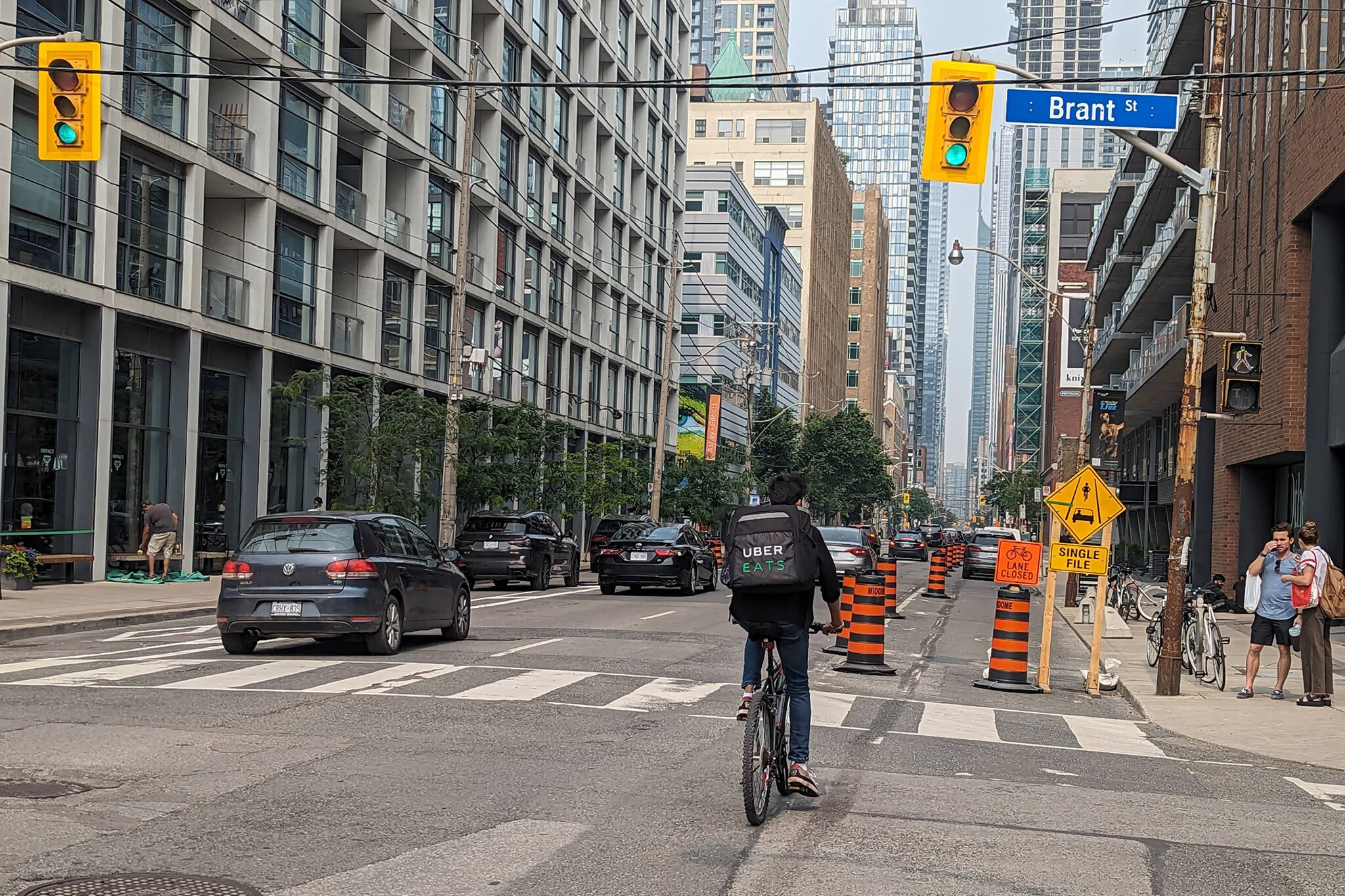
Someone documents 'hellscape' commute on one of Toronto's most dangerous streets
Getting around Toronto on two wheels can be an arduous task. The city may have a fast-growing network of bike lanes, but constant blockages and hazards are a constant reminder that cyclists are not afforded the same respect as infrastructure designed for pollution-spewing cars.
Cycling safety advocate and personal injury lawyer David Shellnutt is a regular rider on the Adelaide Street West bike lane, which was recently relocated to the north side of the street, confusing cyclists. After posting about the state of cycling paths in the area, Shellnutt was flooded with DMs from fellow riders disgruntled about the confusing conditions.
Armed with a camera, Shellnutt decided to document the state of the bike lanes for himself on Wednesday evening.
After weeks of riding this hellscape & dozens of DMs from concerned cyclists we rode down w our camera & wrote a blog about the mayhem that is Adelaide St. W:https://t.co/dAwMU9xan2
— The Biking Lawyer (Dave Shellnutt) (@TheBikingLawyer) June 29, 2023
Ride safe, report to authorities & read our guide on how to do it all! #notsafe4bikesTO pic.twitter.com/kVrOQhv390
The change in cycle track is being bundled with City-led watermain repairs as well as streetcar and road resurfacing work, with the City stating that moving cycle tracks to the north side of the street cuts down on conflicts between cyclists and turning trucks.
It's a well-intentioned move, but Shellnutt argues that the rollout of the changes has created new risks for cyclists.
In a blog post, Shellnutt explains that, while there have been some improvements in new signage directing cyclists, there are still major issues.
"Bathurst to Victoria (a huge cycling/transit corridor) [is] an awful mess of construction, motor vehicle traffic and inconsistency ensue," writes Shellnutt.
"While the bike lane is being moved to the other side of the road, cyclists are not provided with much guidance, an alternate route, or a temporary bike lane."
He points out the unequal treatment of cyclists and motorists, writing that cars "are now able to park in both the old and new bike lanes, on either side of the road. All modes of transportation are thereby forced into 2 shared lanes. That is, until construction forces them into 1 lane."
Shellnutt says the street "should be a case study for the City of Toronto in juggling construction projects, increased traffic (from other closed corridors) and safe infrastructure."
He acknowledges that, while the City's website offers useful tips for navigating construction projects, "these well-laid plans and a helpful website do not necessarily provide the street-level clarity that cyclists and other road users need."
"It remains very confusing to cycle down Adelaide," he says. "Now we have bike lane closure signs, but they are inconsistent. We also have parking everywhere."
Shellnutt suggests that what works for motorists can be implemented with bike lane interruptions, saying, "We need to borrow from jurisdictions that undertake large construction projects impacting a variety of road users. What do they use, let's use that."
And he doesn't expect it to improve any time soon, as a planned York to Victoria bike lane relocation won't go forward until the spring, potentially making for some challenging winter cycling.
"Removing conflicts is critical and we thank the City for their work. We ask that our long-term plans to address conflict do not inflame it in the short term."
With up to 6,000 daily cycle trips on this confusing route, Shellnutt pens a suggestion for the City, asking, "what outreach has been done to the cycling community to explore other route options or set up temporary bike lanes along this massive corridor?"
"Could King Street not be an option? Could the old bike lane not remain operational in whole or in part until the new bike lane is created?"
David Shellnutt
Latest Videos
Latest Videos
Join the conversation Load comments







